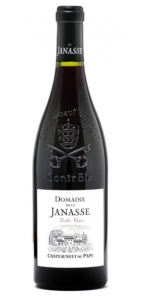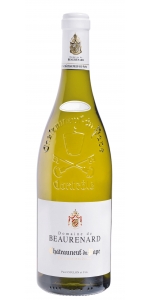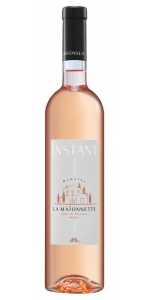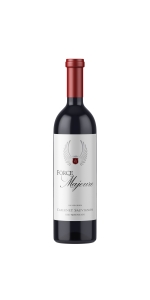Domaine de la Janasse Chateauneuf-du-Pape Cuvee Chaupin 2018
| Country: | France |
| Regions: | Rhone Chateauneuf du Pape |
| Winery: | La Janasse |
| Grape Type: | Grenache |
| Vintage: | 2018 |
| Bottle Size: | 750 ml |
Domaine de la Janasse Chateauneuf-du-Pape Cuvee Vieilles Vignes is made from 65% Grenache, 20% Mourvèdre, 10% Syrah, 5% divers.
In contrast to Chaupin, which is made from old-vine Grenache on sandy soils, the cuvée Vieilles Vignes is from old vines of Grenache, Mourvedre, Syrah along with smaller percentages of other permitted varieties that are grown in these old vineyards. The wine is sourced from 4 terroirs: pebbly clay, sand, gravelly red clay and sandy limestone. Vieilles Vignes is always the most powerful and concentrated Châteauneuf-du-Pape cuvée made at Domaine de la Janasse.
Review:
The 2020 Châteauneuf Du Pape Vieilles Vignes also saw some stems (the estate started keeping some stems with the 2016 vintage) and was 75% destemmed, with the blend being 70% Grenache, 20% Mourvèdre, and the rest Syrah, Cinsault, and Terret Noir. As usual, it’s a more powerful, black-fruited wine comparted to the Cuvée Chaupin and has lots of crème de cassis, liquid violet, crushed stone, woodsmoke, and peppery herbs. It displays the vintage’s purity and freshness yet brings the concentration as well as the structure. I’ll be shocked if it’s not in the handful of top wines in the vintage.
-Jeb Dunnuck 96-98 Points
Domaine de la Janasse Chateauneuf-du-Pape Cuvee Vieilles Vignes is made from 65% Grenache, 20% Mourvèdre, 10% Syrah, 5% divers.
In contrast to Chaupin, which is made from old-vine Grenache on sandy soils, the cuvée Vieilles Vignes is from old vines of Grenache, Mourvedre, Syrah along with smaller percentages of other permitted varieties that are grown in these old vineyards. The wine is sourced from 4 terroirs: pebbly clay, sand, gravelly red clay and sandy limestone. Vieilles Vignes is always the most powerful and concentrated Châteauneuf-du-Pape cuvée made at Domaine de la Janasse.
Review:
The advantages of old vines are perhaps most evident in the more difficult vintages (whether hot and dry or cool and rainy). The 2021 Chateauneuf du Pape Vieilles Vignes is a strong effort, delivering supple, velvety waves of ripe black cherries and black raspberries. Medium to full-bodied, it's rich and concentrated without seeming at all heavy or unbalanced, finishing long and juicy. It's approximately 75% Grenache, 15% Mourvèdre, 5% Syrah and 5% other varieties, keeping in mind that up to 15% of the old Grenache vines are actually Clairette Rose.
-Wine Advocate 96 Points
All older vintage wines have been purchased from a single collectors cellar. Pictures can be requested before shipment.
All older vintage wines have been purchased from a single collectors cellar. Pictures can be requested before shipment.
Domaine de Beaurenard Chateauneuf-du-Pape Blanc is made from Clairette blanche & Rose, Grenache Blanc & Gris, Bourboulenc, Roussanne, Picpoul and Picardan.
Gold bright green color. Expressive nose with pear and stone fruits aromas (peach, apricot) with jasmine and roasted almonds notes. The mouth is smooth and fleshy like stone fruit we can smell, with a long a nice finish.
Review:
Bright golden yellow, silver reflections. Delicate herbal spices, a hint of chamomile and mandarin zest, pears and blossom honey are underneath. Juicy, elegant, white peach, delicate honeydew melon, mineral and harmonious, fine fruit sweetness, good ripening potential.
-Falstaff 92 Points
Domaine La Maionnette Rose Cotes de Provence is made from 60% Syrah, 20% Cinsault and 20% Grenache.
The plots of Domaine de la Maïonnette benefit from a clay-limestone soil and are located on a plateau surrounded by hundred-year-old oaks. Bordered by the Provencal scrubland, the vineyard enjoys a dry climate typical of the region.
An emblematic cuvée of the estate, this Cotes de Provence rosé reveals concentrated aromas of citrus fruits and white flowers, and a beautiful structure. The fresh palate brings out sweet candy notes, gooseberry and litchi, and delivers bright acidity and ample length on the finish.
Domaine de la Janasse Chateauneuf-du-Pape Cuvee Chaupin is made from 100 percent Grenache.
A beautiful bottle, archetype of the appellation, which expresses the quintessence of Grenache in its cradle of Châteauneuf du Pape. Between notes of black fruit and violets, this vintage advances in time with suppleness, with already melted tannins.
Review:
This bursts forth with delicious crushed plum, cherry puree and raspberry coulis notes that stretch out slowly through the lengthy, anise- and black tea–infused finish. Not shy with its fruit, but this has more than enough energy and detail for balance. Best from 2021 through 2038.
-Wine Spectator 95 Points
As usual, the 2018 Chateauneuf du Pape Chaupin displays more red fruit than the main bottling, being 100% Grenache from sandier soils. Raspberries and cherries appear on the nose alongside subtle hints of garrigue. The full-bodied palate is almost airy in feel, supported by a latticework of silky tannins and bright acids, while simultaneously adding bass notes of dark chocolate and licorice that linger on the finish. It's an impressive effort.
-Robert Parker 95 Points
Aimé, the founder
In 1967, Aimé Sabon came back from his military service. He took over his father’s vines, who used to take his grapes to the wine cooperative. In 1973, Aimé built his own cellar. Domaine de la Janasse was born and named after the family farm that was in Courthézon, in the locality of “La Janasse”. Aimé was ambitious. He knew he had fabulous soil and he wanted to expand the estate by acquiring new plots. From 15 hectares at the very beginning, La Janasse has now reached more than 90 hectares.
From father to children
In 1991, after a technical diploma in viticulture and oenology in Beaune, and another one in marketing in Mâcon, Christophe Sabon –Aimé’s eldest son– came back to La Janasse where he was given the keys to the cellar. From then different cuvees were developed, new markets conquered. In 2001, Isabelle –Aimé’s daughter– graduated as an oenologist from the University of Toulouse, and joined the team. With Hélène, Aimé’s wife, the family was reunited again in La Janasse.
The estate Cabernet Sauvignon is grown primarily along the southwest ridge of the vineyard. The vines produce small berries with bountiful flavor, concentration and intensity, but also a good degree of finesse, excellent structure and layers of complexity that will continue to develop during extended bottle aging for those who want to cellar and age their wines. The wine is powerful, elegant, full-bodied.
Bottled unfined and unfiltered.100% free run
Pumpovers and punch-downs, up to 45 day macerations
Native yeast, 5 day cold soaks
22 months in 75% new French oak barrels
Fermented in concrete and stainless closed top tanks.
Review:
"The 2017 Cabernet Sauvignon Red Mountain Estate is another powerful wine from this team. Opulent notes of blackcurrants, graphite, chocolate, crushed rocks, wild herbs, and espresso all give way to a full-bodied Cabernet Sauvignon that has loads of fruit, a superstar of a mid-palate, ripe tannins, and a great finish. It’s another 2017 that’s going to benefit from at least 2-4 years of bottle age and have 20 years or more of longevity."
- Jeb Dunnuck (April 2020), 95+ pts
- back
Kinsella Estates Jersey Boys Cabernet Sauvignon is made from 100 percent Cabernet Sauvignon.
Winemaker: Thomas Rivers Brown
Pure 100% cabernet Sauvignon, this vineyard continually astonishes. Loads of loamy soil notes followed by blue and black fruits give this cabernet massive depth and beautiful integrated tannins. Milk chocolate, crème de cassis and tobacco give this massive wine the depth you come to expect with Napa cabs, but it is all Sonoma County, all from our magnificent little private valley which sees sun all day! We buy no fruit; we sell no fruit.
Jersey Boys Vineyard (Kevin Kinsella is the largest individual investor in the hit Broadway show "Jersey Boys")
Jersey Boys is a six-acre vineyard that was replanted in 2008 with four different clones of Cabernet Sauvignon, handpicked by winemaker Thomas Rivers Brown.
Wow…just Wow!! This wine has it all. Not as “big” as past vintages this wine is gangbusters right out of the gate. Ripe blackberry, juicy and rich with a wonderful chocolate core. Has a dusky quality that we have seen in this vineyard in the past that tricks your brain into thinking the wine is older than it is. It’s pure. It’s rich. It’s delicious! Winemaker Thomas Rivers Brown
Any vegetable or meat in the grill. Delicious with Chocolate as well.
Corne Loup Lirac Blanc is made from 40% Grenache Blanc, 35% Viognier and 25% Marsanne
No Oak
The wine boasts a light yellow and brilliant color, fine floral and fruity notes. It is fat, ample and powerful in the mouth with a lot of freshness.










